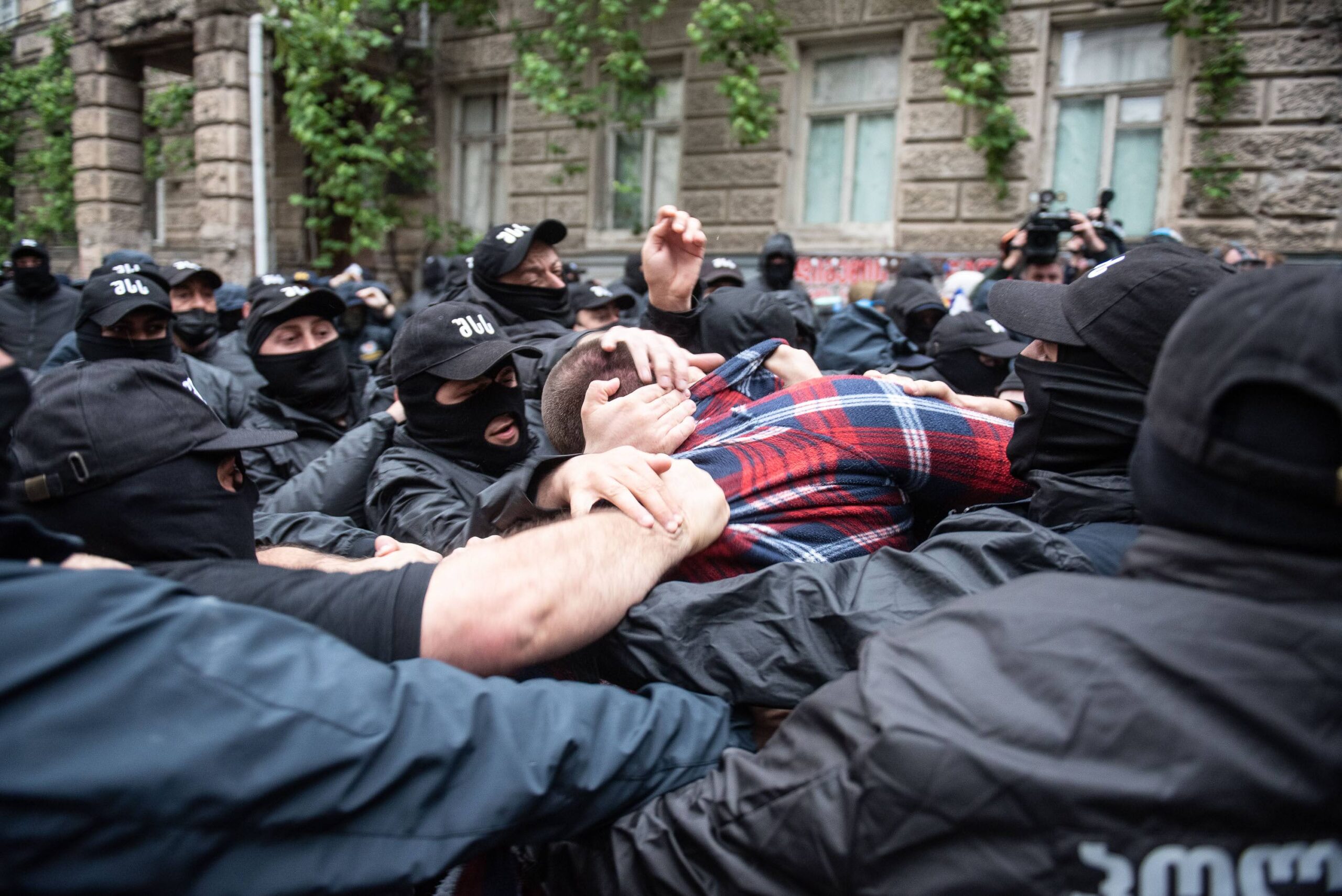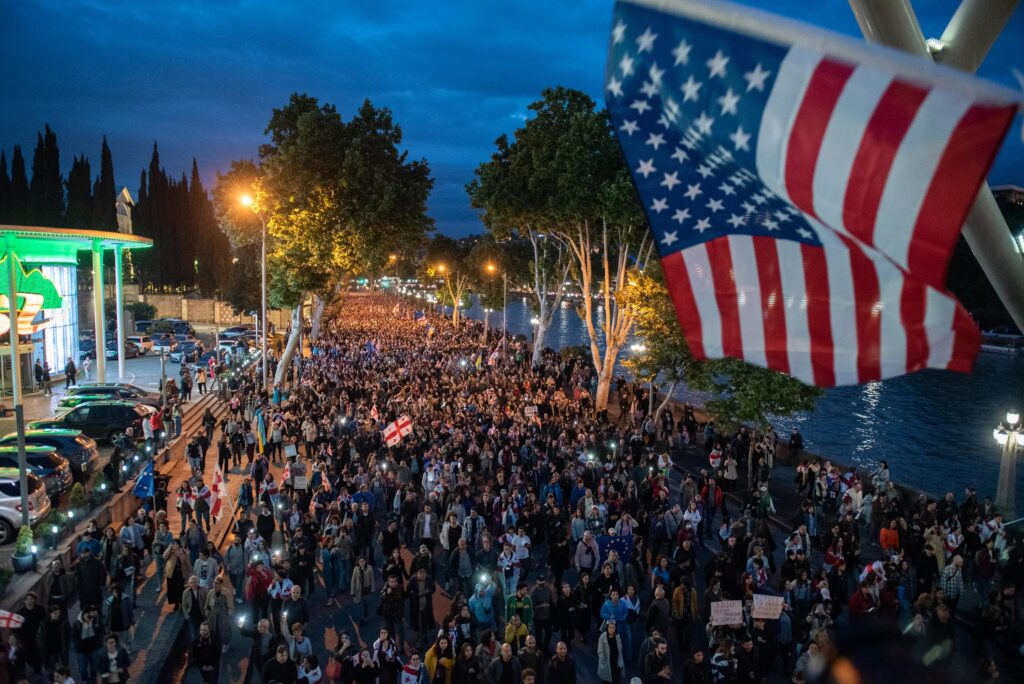Washington has announced that it has sanctioned ‘dozens’ of Georgian citizens in relation to the foreign agent law, including politicians involved in its adoption, and their family members.
US State Department spokesperson Matthew Miller announced on Thursday that Washington was imposing individual visa bans on members of the ruling Georgian Dream party, MPs, law enforcement officials, private citizens, and their immediate family members.
‘The United States remains deeply concerned with the Georgian Dream party’s anti-democratic actions as well as its recent statements and rhetoric’, said Miller. ‘These actions risk derailing Georgia’s European future and run counter to the […] Georgian constitution and the wishes of its people’.
He said the sanctions would cover individuals ‘complicit’ in undermining democracy in Georgia by ‘undermining freedoms of peaceful assembly and association, violently attacking peaceful protesters, intimidating civil society representatives, and deliberately spreading disinformation at the direction of the Georgian Government’.

Miller said the US maintained hope that Georgian Dream would ‘reconsider’ its actions, warning that the US was ‘prepared to take additional actions’.
Asked about who the bans would affect, Miller stated that he was unable to provide reporters with the names of those sanctioned. He noted that they also did not inform the individuals of the sanctions imposed on them, and that they would only learn of them once they tried to cross the US border. He added, however, that those who currently held a valid visa would be notified following his announcement.
Miller stated that the US was not ‘dictating in any way to the government of Georgia what laws it should pass’.
He suggested that the law had conversely been inspired by ‘another country that has passed its own version of the law’.
‘It’s Russia that passed this version of law […] and clearly was the model for the law that Georgia has passed’.
Miller also noted that the US would continue to review the financial assistance it provides to Georgia, saying that it was ‘potentially at jeopardy if Georgia is not pursuing policies that are in line with the interests and values we have seen it express here to date’.
Georgian Dream mocks US sanctions
The ruling party in Georgia derided Washington’s sanctions, with Tbilisi Mayor and Georgian Dream Secretary General Kakha Kaladze stating on Friday that ‘no one is afraid of these sanctions’.
‘Talking about sanctions just makes me smile’, he said, adding that he did not have a US visa and that he had not been notified of any sanctions being imposed against him.
Kaladze earlier this week stated that he was ‘certain there won’t be any sanctions’.
Georgia Dream’s parliamentary leader, Mamuka Mdinaradze, also appeared to mock the sanctions, stating that sanctioned individuals had a ‘right to know, at least, whether we are the first legislators in the world to be sanctioned for passing a law’.
‘Also, the Georgian opposition–[secret services] can rejoice in light of more specific news, and not with a tenth announcement of general hints’, he said.
Dimitri Khundadze, a member of the parliamentary majority, deemed the sanctions to be the exertion of pressure on Georgia’s democracy, and a ‘black day for Western democracy’.
‘This is gross interference in internal state affairs and pressure on state institutions […] This is a precondition for having Ukrainian Maidanisation in Tbilisi as well, which will lead to the development of war. Because the reality is, we would rather be sanctioned [ourselves], than for our citizens — especially the youth — to receive summons to war’, he said.
Georgia’s opposition warned that Georgian Dream’s actions could damage Georgia’s economy.
Levan Khabeishvili, the chair of the United National Movement, Georgia’s largest opposition party, stated on Thursday that the ‘maliciousness of [Georgian Dream founder Bidzina] Ivanishvili’s team affects the pockets of Georgian citizens’.
‘What investor would enter or stay in such a country? Under Ivanishvili, economic collapse is inevitable!’, said Khabeishvili.
Salome Samadashvili, a Lelo MP, stated that October’s upcoming parliamentary elections were a ‘referendum on Georgia’s sovereignty’, and ‘whether we want to maintain an independent state or not’.
‘Without the support of our main ally, the USA, Georgia simply cannot survive as an independent state’, she said.
The US announced its plans to impose travel and financial sanctions against individuals involved in the foreign agent law and their families earlier in May, with Assistant Secretary of State for European and Eurasian Affairs Jim O’Brien warning that further action could be taken if the law went forward in its then-current form.
Georgian Dream’s reintroduction of the foreign agent law was met with mass protests throughout May, with Georgia’s Western partners continuously stressing that the law was anti-European and anti-democratic, and that MPs who voted for the law could face sanctions.
The law labels any civil society or media organisation that receive at least 20% of their funding from outside Georgia ‘organisations carrying out the interests of a foreign power’. Such organisations are subject to ‘monitoring’ by the Ministry of Justice every six months, which could include forcing them to hand over internal communications and documents and confidential sources. Organisations and individuals who do not comply will be subject to large fines.




 7 June 2024
7 June 2024



